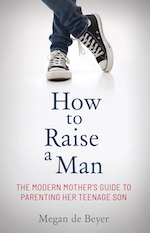As mothers, we often issue instructions or make requests of our children and whether we intend to or not, we have high expectations that they will do as we ask. Yet what about when they don’t? And what about when they drag their heels or just refuse to do whatever we ask?
We become confused, frustrated and irritated. We will often yell to get our kids to comply. At times like these, I like to remind mothers that our children, especially teens, have different personality tendencies and sometimes we need to reorientate how we ask, tailoring our approach to their personality.
I find my Four Types of Boys list below a useful tool in helping mothers understand how to adapt their demands. Some people find clear external goals to motivate, while others prefer to set internal goals. When we have expectations of compliance, there are different tendencies within our children’s personalities that are triggered. I always found it so much easier when I took time to understand my son’s preferences.
And yes, there are a lot of rebels out there!
The four types of boys and how they respond
Author Gretchen Rubin named the “four tendencies”, which we all have when responding to expectations, in her book The Four Tendencies. I explain each one below. Can you see your son in any of them? Or yourself? I’m not a believer in hard and fast rules about personality types, but Gretchen’s ideas are useful, since they will help you understand how your teen responds to an instruction.
1. The Upholder
This personality type is motivated by fulfilment, and often responds readily to inner and outer expectations. This could be his own expectations versus others’ expectations of him. They are high achievers and will do things upon instruction. Their inner motivation and your expectations align easily. So, they will do what’s good for them. They like to tick things off from a list.
They say things like, “I like schedules and rules, yet I’m happy to draw them up on my own.” Parents delight in these teens, but often fret that they are “working too hard”.
2. The Questioner
This type wants information and must meet his own inner expectations. If you are telling a questioner to do something, their response is normally, “Why?” As a parent, you can help this teen make sense on a personal level. Give him the reasons and let him customise the rules or chores. Encourage him to research the best options. If he understands an instruction, he will do it.
3. The Obliger
These are the people-pleasers and therefore meet outer expectations first. They want support and validation, and like to do something in a group. Parents should encourage these teens to sign up to group activities. They are motivated by their peer group and struggle to meet the expectations they impose on themselves. They say things like, “Please monitor me. Help me stick to it, please.” These teens need you to be around to assist them.
4. The Rebel
If your child is a natural rebel, then the teen years are tricky! They resist their own inner expectations and those of others. They say things like, “I will do it in my own time. I choose. No-one tells me what to do.” They love freedom of choice, and you can’t lock them in. Rebels love the act of resisting the norm, and parents need to keep reminding these teens of possible outcomes.
As a parent, you need to learn to frame an instruction in a rebel way: “Here are the options and here are the consequences. You choose, as I think that you know what you want.” Present them with both options and consequences.
12 things to try saying instead to get your child to listen
I was staying with a Californian family for the weekend when I was taken in by the way the parents communicated with their children. They put a positive spin on everything.
I found myself laughing when the father said to his loudly whining daughter, “Darling, you have really turned the volume up today!” This was a far cry from many irritated parents who snap in this exact predicament, with things like, “Would you shut up!”; “What’s wrong with you?”; “Tone it down now, I’m trying to read” etc.
Our perspective is so important in communicating with our children. When you are frustrated or irritated by your kids, you should try shifting your perspective and even try adding humour. I sat down and came up with the below points to challenge mothers to change their habitual language. I find mothers pick them up very quickly. The atmosphere in a home always changes when you can laugh at yourself and with your kids. Finding the humour is essential, because it will stop your teen in his tracks.
Warning: Don’t be sarcastic—it backfires!
1. Instead of: What’s the problem here?
Try saying: What can you learn from this challenge?
2. Instead of: Stop this immediately!
Try saying: Why are you finding this so enticing?
3. Instead of: Your behaviour is making me mad!
Try saying: I notice you are trying a different way to do this.
4. Instead of: You are shouting!
Try saying: I notice you are playing with volume today.
5. Instead of: That is so stupid.
Try saying: I see you are experimenting with an interesting approach to this.
6. Instead of: You are rude!
Try saying: Does this approach feel good to you?
7. Instead of: This is so selfish.
Try saying: Is this a way of you claiming your autonomy?
8. Instead of: You are so ungrateful.
Try saying: I suggest you are not seeing the bigger picture right now.
9. Instead of: You are lazy.
Try saying: I notice this does not ignite or inspire you.
10. Instead of: Your room is untidy.
Try saying: Well, this is a creative arrangement of your belongings.
11. Instead of: Stop fighting!
Try saying: I notice you feel strongly/passionately about . . .
12. Instead of: That’s obnoxious.
Try saying: You have an interesting opinion.

Megan De Beyer is an international specialist parent psychologist and the mother of two young men. Her essential book How to Raise a Man is out now with Hachette Australia. This is an edited extract.
How helpful was this article?
Click on a star to rate it!
0 / 5. 0
Be the first to rate this post!
Megan de Beyer
Related posts
Subscribe
Receive personalised articles from experts and wellness inspiration weekly!

